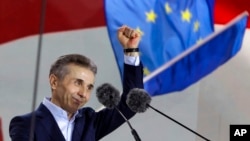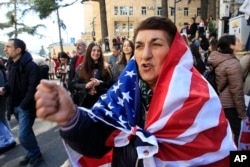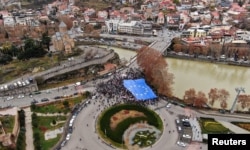On top of a steep hill overlooking Tbilisi, tucked behind the city’s ancient fortress, sits a sprawling, futuristic $50 million mansion that locals call “the glass palace.” A shark tank, private zoo and helipad lie within the heavily guarded compound. Its owner, Bidzina Ivanishvili, reportedly calls it his “James Bond” house.
Ivanishvili is Georgia’s richest citizen by far. The 68-year-old multibillionaire founder of the ruling Georgian Dream party was rarely seen in public for much of the last decade — but he is now pulling the strings of Georgian politics, according to Eka Gigauri, head of the anti-corruption group Transparency International in Georgia.
“Ivanishvili is the real ruler of this country,” Gigauri said. “He owns one-third of Georgian GDP, and he made his fortune in Russia in the late '90s. He still has the interests in Russia through his offshore companies — and not only him but his family members as well. ...
“Is it possible to expect, or is it realistic to expect, from such an individual that he will do everything for Georgia to become the EU and NATO member? I don't think so,” Gigauri told VOA.
Ivanishvili, for his part, has rarely spoken in public since a brief term as prime minister in 2012-13 apart from a speech in late April in which he defended a controversial “foreign agent” law as needed to prevent foreign intelligence agencies from undermining the government through the financing of nongovernmental organizations.
West vs Russia
Analysts say Georgia is torn between a future aligned with the West or with Russia.
Protests erupted in March this year after the government introduced the “foreign agent” law, which requires any organization receiving more than 20% of its funding from foreign sources to register as a foreign agent. It closely resembles similar legislation in Russia which has forced many nongovernmental and media organizations to close or move abroad.
The protests against the legislation in Georgia have evolved into anti-government demonstrations, as the country prepares for crucial elections in October.
Ghia Nodia, a political analyst at Georgia’s Ilia State University, said, “With this so-called Russian law or foreign agent law, [Georgian Dream] effectively turned its back on Europe, even though they don't admit to it openly.”
EU aspirations
The Georgian government insists it still wants to join the European Union by 2030, although the bloc has warned that the foreign agent law could derail that process. The EU granted official candidate status to Georgia last year, hoping to set it on the path to democratic reform and Western integration. But the West misread Georgia’s billionaire puppet master, Nodia said.
“The Georgian state has been captured by a specific person — Bidzina Ivanishvili — who is very secretive, whose agenda was not clear for people,” Nodia said. “Some people, including in the West, had illusions that he was maybe a little bit of a strange guy, but ultimately he is also committed to values and norms of Western democracy.
“But they were proved wrong and skeptics were proved right, unfortunately. And it appears that he never had any real kind of commitment to democratic norms,” Nodia told VOA.
Protests
The streets of Tbilisi have become a canvas for anti-government graffiti. Alongside EU, U.S., Georgian and NATO colors, protesters have daubed the blue and yellow of the Ukrainian flag — a show of solidarity as Kyiv tries to resist Russian occupation and domination. One slogan reads “Georgia is Ukraine; Ukraine is Georgia.”
Russia’s 2022 invasion of Ukraine forced Ivanishvili and his Georgian Dream party into the limelight, said Nodia.
The invasion “somehow put him on the spot that he had to take sides more clearly. He didn't want to. But eventually he moved more in the Russian direction, even though Georgian Dream tries to hide it, not to say it openly. Ivanishvili made a strategic decision that Russia is winning this war, so we should stay with the winner, or prospective winner, as he saw it,” Nodia said.
Stoking fear
At a government-organized rally in April aimed at countering the opposition demonstrations, Ivanishvili said a Western “global party of war” was meddling in Georgia, citing a host of conspiracy theories about the role of nongovernmental organizations in the country. His party accuses the West of trying to persuade Georgia to open a new conflict against Russia, without providing any evidence.
The propaganda is part a well-rehearsed autocratic playbook, said Aka Zarkua of the Governance Monitoring Center in Tbilisi, a nongovernmental organization that tracks government spending and communications.
“The main propaganda line right now is that if we [Georgian Dream] are out of power, war with Russia is inevitable. So that is one of the biggest things. And as a country which experienced Russian aggression three or four times in the last 30 years, and a population traumatized by this experience, it is working,” Zarkua said.
“They are trying to portray the West and Western countries — especially the United States and European Union — as some kind of enemy of Georgian traditional interests and family values,” Zarkua said.
The government denies stoking public fear. Fridon Injia, an MP with the European Socialists party who voted for the foreign agent law, told VOA the government is seeking to carve its own independent future.
“The main goal of the Georgian government now is to maintain peace, because we have seen what the war has done to other countries. So, it’s our main goal to maintain peace and for the Georgian government to avoid any kind of provocation that could spark a military conflict,” Injia said.
Western mistakes
Since regaining independence following the collapse of the Soviet Union in 1991, Georgia has received financial and political support from the West. In addition to its EU aspirations, Georgia is a close partner of NATO, and the alliance decided in 2008 that the country would become a future member, although no timeline has been agreed upon.
So why has Georgia strayed from its path to Western integration?
“If we're talking about Western mistakes, the biggest mistake was the overall assumption about the threat of Russia and tyranny — that it was a headache, but not a fundamental threat,” said Giga Bokeria, chairperson of the European Georgia party and the secretary of the National Security Council of Georgia from November 2010 to November 2013.
“Even after the 2008 invasion in Georgia, even after the 2014 invasion in Ukraine, there was no shift in understanding that this is a fundamental battle, and that resetting the relationship [with Russia] was only empowering the heirs of the evil empire of the Soviet Union,” Bokeria said.
“So, it’s a lack of focus, lack of attention, and overall, a misunderstanding that what’s going on in Georgia is part of this bigger confrontation with Russia. But now I think … that after this full-scale invasion in Ukraine we now see an overall turn to a sober understanding of the challenge,” Bokeria told VOA.
Backlash
The Geogian government was taken by surprise at the strength of the backlash to the foreign agent law, which has politicized younger generations, said analyst Ghia Nodia.
“Some people say that now we are actually more optimistic than we were in February or March before this law was introduced. Because this law and protest woke up the Georgian people. We are kind of facing a precipice,” he said.
While there is optimism that the October election could bring a change of geopolitical direction in Georgia, it’s clear that the government — and its billionaire master Ivanishvili — won’t relinquish power without a fight.








